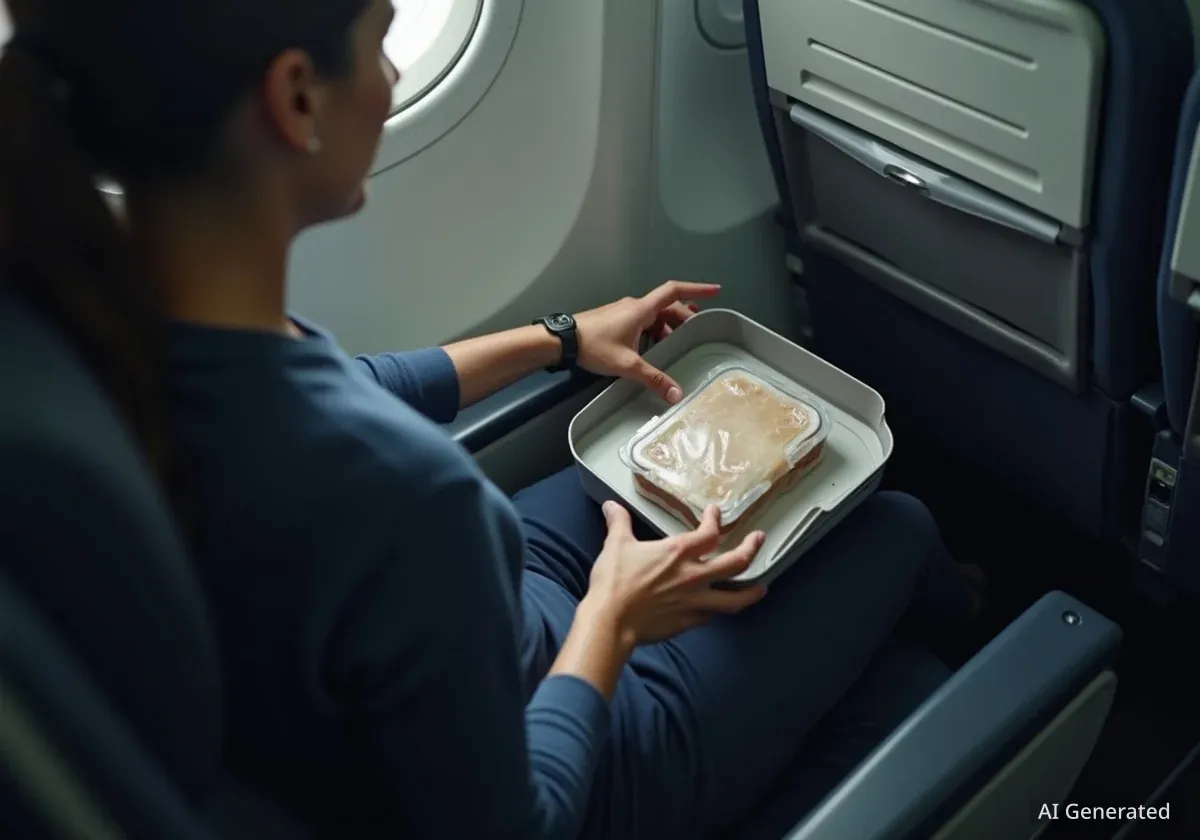An Air India business class passenger recently reported a significant issue during a 19-hour flight: a non-functional tray table. The passenger stated they were instructed to eat their meals on their lap, raising questions about consistency in long-haul business class services.
Key Takeaways
- An Air India business class passenger experienced a non-working tray table on a 19-hour flight.
- The airline reportedly offered no compensation and did not provide written confirmation of how the issue would be addressed.
- This incident highlights ongoing concerns about consistency in premium cabin services on long-haul flights.
Air India Business Class Experience Under Scrutiny
The passenger's account describes a challenging experience on a lengthy Air India flight. A basic amenity like a tray table, essential for dining and work in business class, was unavailable. This forced the passenger to manage meals without a proper surface, directly impacting comfort and service quality.
The passenger sought written assurance from Air India regarding the resolution of the issue. However, according to the report, no compensation was offered, nor was a written confirmation provided by the airline. This lack of response adds to the passenger's dissatisfaction with the service.
"Air India: please confirm in writing that you’ll deal with a non-working tray table. No compensation offered."
Consistency Concerns in Premium Air Travel
This incident brings into focus the varying quality of business class services across airlines, particularly on extended international routes. Passengers paying for premium cabins expect a consistent level of comfort and functionality. When core amenities fail, it can significantly detract from the travel experience.
Fact: Long-Haul Business Class
Long-haul business class flights typically offer amenities like lie-flat seats, enhanced meal services, and personal entertainment systems. A functional tray table is a standard component of these offerings, crucial for dining and work.
The reported lack of compensation or a clear resolution plan from Air India suggests a potential gap in their customer service protocols for handling in-flight equipment malfunctions. Airlines aim to provide a seamless premium experience, and such issues can undermine passenger trust and loyalty.
Industry Trends and Passenger Expectations
Beyond this specific incident, the broader aviation industry faces challenges in maintaining consistent service quality. Airlines are constantly working to meet and exceed passenger expectations, especially in competitive premium travel segments.
Context: Passenger Preferences
Some airlines, like Emirates, are known for tracking premium passenger preferences to personalize future flights. This includes details such as preferred bottled water or specific meal customizations. Such efforts aim to enhance the passenger experience through attention to detail.
The ability to log and recall passenger preferences, even small ones, can significantly improve customer satisfaction. This practice, while challenging for large airlines, shows a commitment to personalized service. Hyatt, a hotel chain, reportedly experimented with a similar system about eight years ago, aiming to remember guest preferences like extra water bottles or specific coffee setups.
Technology and Customer Service
Leveraging technology to track and cater to individual passenger needs could become a key differentiator in premium travel. While some airlines have discussed this for years, implementing it effectively remains a complex task. The goal is to make each journey feel more tailored and less generic.
- Personalized Service: Recording and applying passenger preferences can enhance the travel experience.
- Operational Challenges: Implementing such systems across a global airline network is complex.
- Customer Loyalty: Consistent, personalized service can build stronger relationships with passengers.
Other Notable Travel Industry Updates
In other travel-related news, a unique flight route opportunity has emerged. Travelers can reportedly fly from Ulaanbaatar, Mongolia, to Glasgow, Scotland, exclusively on United Airlines 737 aircraft next summer. This long-distance route on a single aircraft type highlights interesting network possibilities within the airline industry.
Fact: United Airlines 737 Route
The proposed Ulaanbaatar to Glasgow route via United Airlines 737s involves multiple connections, showcasing the extent of airline networks and potential for specific aircraft type enthusiasts.
Separately, a promotional offer from Rakuten is drawing attention. New Rakuten members can receive $50 (or 5,000 Amex points) when spending $50 at participating merchants. A simple way to utilize this offer involves purchasing a $50 gift card for services like Uber, DoorDash, Southwest Airlines, or Delta through the Rakuten portal. This effectively makes the $50 gift card free, or even more valuable if opting for Amex points.
Observations on Commuter Culture
Meanwhile, observations about commuter behavior continue to surface. A social media post described a morning Amtrak train from New York to Washington D.C. as being filled with passengers "pretending to work" on their laptops, sending emails, and keeping their Microsoft Teams status green. This highlights the evolving nature of work and travel, with many professionals integrating their work into their commutes.
This trend reflects a shift in workplace dynamics, where remote or hybrid work models allow for greater flexibility. Commuters are increasingly using travel time for productive work, blurring the lines between personal and professional time. The perception of whether this is "pretending to work" or actual work varies, but the sight of laptops on trains is now common.
Antitrust Actions and Market Impact
In economic news, recent antitrust actions by the Biden administration have drawn commentary. Some argue that these efforts, intended to promote competition, have instead protected larger entities and led to less competition overall. This perspective suggests that government interventions in market dynamics can sometimes produce unintended consequences.
Antitrust policies aim to prevent monopolies and ensure fair market practices. However, their execution and impact are often subject to debate. Understanding the actual outcomes of such policies is crucial for assessing their effectiveness in fostering a competitive economic environment.





